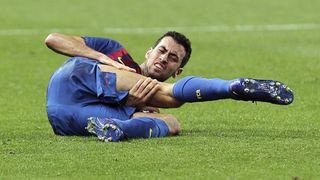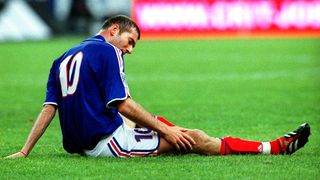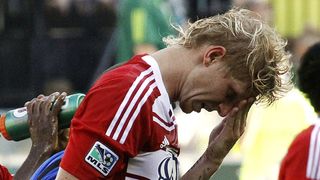Know your pains
Aches, twinges, sprains – the start of the season can hurt. Dr Peter Brukner, ex-Liverpool physio, explains five common football pains and how to treat them


1 SIDE STITCH
What’s happening: The peritoneal muscles, which hang from your diaphragm – the muscle that separates the stomach from the heart and lungs – becomes stressed because blood is pumping out to your limbs and away from the diaphragm.
Why? “You’ve heard all the old wives’ tales – running too soon after a meal – but we don’t think that’s the cause. That said, we haven’t come up with a better explanation. Stitches are interesting because we still don’t understand why people get them,” says Dr Brukner.
Treatment: “Wait for the diaphragm to recover and the stitch will settle down. Then you can carry on running.”
Get FourFourTwo Newsletter
The best features, fun and footballing quizzes, straight to your inbox every week.

2 TIGHT HAMSTRINGS
What’s happening: If you’ve been exercising you maybe suffering from DOMS (Delayed Onset Muscle Soreness). Alternatively, if you spend your days sitting behind a desk your hamstrings have got stiff as a result of restricted movement.
Why? “There’s a close relationship between the back – the lumbar spine – and the hamstring. If your back is tight and the nerves are restricted, you’ll complain of a tight hamstring,” says Dr Brukner. “Similarly if your gluteal muscles tighten up from excessive activity you can suffer from a tight hamstring.”
Treatment: “Stretching and massage can help release the tightness, but it’s important that you condition your body for high-speed running so your muscles are ready to cope with the demands of sprinting.”

3 LACTIC ACID BUILD-UP IN THE THIGHS
What’s happening: The body breaks down glucose into a substance called pyruvate, which it uses for energy. When the body is starved of oxygen it temporarily converts pyruvate into lactate. High levels of lactate increases acidity in the muscle cells, creating a burning sensation.
Why? “It’s a common misconception that lactic acid build-up is responsible for muscle soreness felt in the days after a game,” reveals Dr Bruker. “But that’s actually DOMS, owing to muscle cell damage. Lactic acid is felt in active muscles and can limit how much you run and jump.”
Treatment: “You need to make sure you’re fully hydrated before the game. Once the final whistle has blown, start the recovery process – ice bath, protein shake, compression garments and the right nutrition.”

4 FEELING LIGHT-HEADED AND NAUSEOUS
What’s happening: Drop in blood pressure and glucose levels, resulting in a lack of oxygenated blood getting to the brain.
Why? “If you’re dehydrated and your energy stores are empty, your body can’t function properly,” explains Dr Brukner. “When you’re overexerting yourself in this condition your lungs and heart can’t get blood and oxygen to your brain fast enough, which makes you feel light-headed and sick.”
Treatment: “The first thing you need to do is get some fluids on board, ideally a sports drinks to restore your blood sugar levels. A carbohydrate gel might also help.”

5 CALF CRAMPS
What’s happening: Your muscles suddenly contract – shorten – causing a painful muscle spasm.
Why? “If you’re dehydrated or your blood glucose levels are low, your chances of suffering from cramp increase,” explains Dr Brukner. “A calf muscle is particularly susceptible because it spans two joints. The nature of football – stopping and starting – means you’re repeatedly contracting and relaxing your muscles, which tires them out, bringing on that painful twinge.”
Treatment: “The main thing is to stretch out. Straighten your leg and get a team-mate to bend your toes backwards, towards your shin bone. You also need to rehydrate your fatigued muscles. A sports drink, full of electrolytes, is ideal.”
Dr Brukner was speaking at the Isokinetic Conference. Isokinetic is a specialist in sports medicine and rehabilitation. Visit isokinetic.com
For more tips on treating injury see:

Thank you for reading 5 articles this month* Join now for unlimited access
Enjoy your first month for just £1 / $1 / €1
*Read 5 free articles per month without a subscription

Join now for unlimited access
Try first month for just £1 / $1 / €1
Most Popular



